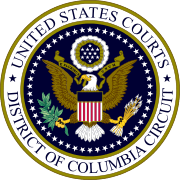Wrenn v. District of Columbia
Wrenn v. District of Columbia, 864 F.3d 650 (D.C. Cir. 2017), is a United States court case in which the United States Court of Appeals for the District of Columbia Circuit held that the "individual right to carry common firearms beyond the home for self defense—even in densely populated areas, even for those lacking special self-defense needs—falls within the core of the Second Amendment’s protections."[1]
| Wrenn v. District of Columbia | |
|---|---|
 | |
| Court | United States Court of Appeals for the District of Columbia Circuit |
| Decided | July 25, 2017 |
| Holding | |
| The individual right to carry common firearms beyond the home for self defense falls within the core of the Second Amendment’s protections. The District of Columbia's requirement that applicants for concealed carry permits demonstrate a "good reason" infringes an individual's right to bear arms as protected by the Second Amendment. | |
| Court membership | |
| Judge(s) sitting | Karen L. Henderson, Thomas B. Griffith, Stephen F. Williams |
This decision struck down the District of Columbia's requirement that applicants for concealed carry permits demonstrate a "good reason," including a "special need for self-protection distinguishable from the general community as supported by evidence of specific threats or previous attacks that demonstrate a special danger to the applicant's life," for carrying a firearm in public.[2][3][4]
References
- "Wrenn v. District of Columbia, No. 16-7025 (D.C. Cir. 2017)". Justia Law. Retrieved 2020-05-03.
- Marimow, Ann E.; Jamison, Peter (2017-10-05). "D. C. will not appeal concealed carry gun ruling to Supreme Court". The Washington Post. Retrieved 2020-05-03.
- Root, Damon (2017-07-25). "In Major Win for 2nd Amendment Advocates, Federal Court Blocks D.C. from Enforcing Conceal-Carry Restriction". Reason.com. Retrieved 2020-05-03.
- Scrofano, Joseph A. (2017-08-22). "What is the Impact of Wrenn v. DC on DC Gun Laws?". No Papered: A Washington DC DUI Lawyer Blog. Retrieved 2020-05-03.